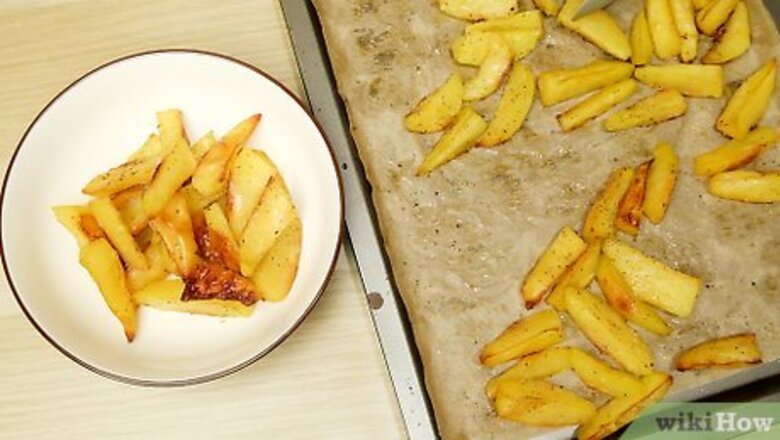
views
Serving and Storage Tips
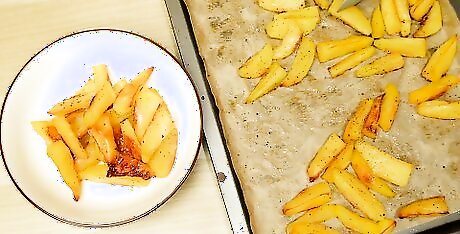
Serve the potatoes as soon as you pull them out of the oven. Unfortunately, even the crunchiest roasted potatoes start to soften as they cool, so don't let them! Try to time your meal so the potatoes are the last thing you pull out of the oven and put on your table. If you can't serve them immediately, avoid covering the potatoes with foil to keep them warm. Foil will trap steam inside and make the potatoes soggy.
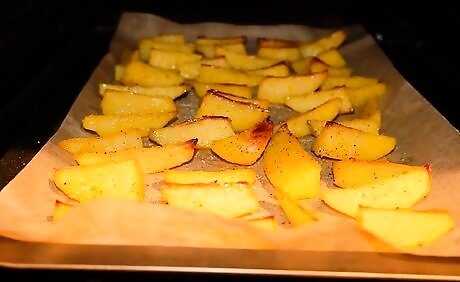
Broil the potatoes for 2-3 minutes if they aren't as crispy as you like. Sometimes you might just end up with potatoes that don't crisp up very much, but don't worry. Spread the potatoes on a baking sheet and pop them underneath a hot broiler for 2 or 3 minutes so the outsides brown and become crunchy. Keep an eye on the potatoes since it's easy to forget about them when they're under the broiler.
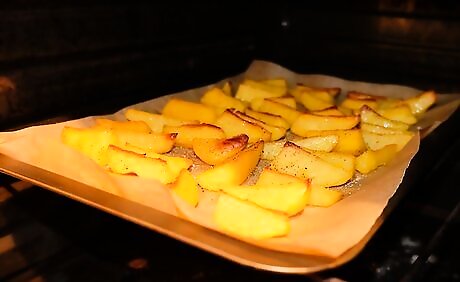
Keep potatoes crisp in a warm oven if you're serving them in 1-2 hours. If there is a slight wait before everyone eats, don't cover the crispy potatoes—this traps steam which will make the potatoes soggy. Just keep them in the oven, but turn the temperature to the lowest setting. Plan on serving the potatoes within 2 hours or your potatoes might dry out. If you keep the potatoes in the oven for more than a few hours, the potatoes can dry out and become chewy.
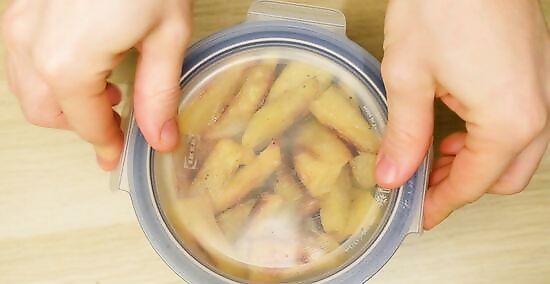
Refrigerate leftovers in an airtight container within 2 hours of cooking them. Whether you have leftover roasted potatoes or you just wanted to prep them in advance, let the potatoes cool to room temperature and transfer them to a shallow airtight container or resealable plastic bag. Then, pop the potatoes into the fridge within 2 hours of removing them from the oven. Don't forget to label the container with the date before you put them in the fridge. Plan on using them within 5 days.
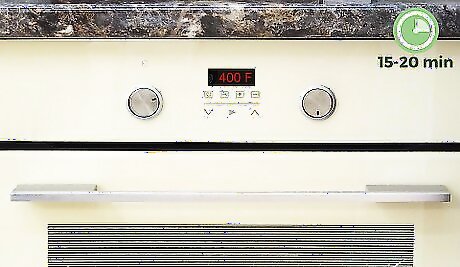
Bake leftovers at 400 °F (204 °C) for 15-20 minutes to crisp them back up. Refrigerated potatoes are soggy, but there's an easy fix! Preheat your oven to 400 °F (204 °C) and spread the leftover potatoes on a baking sheet. Cover the sheet with foil and heat the potatoes in the oven for 10 to 15 minutes. Then, take off the foil and cook the potatoes for 5 more minutes so they become crunchy on the outside. Avoid microwaving your roasted potatoes since they'll become soggy. Don't reheat your potatoes more than once since the texture won't be as crunchy.
Crispy Oven-Roasted Potatoes
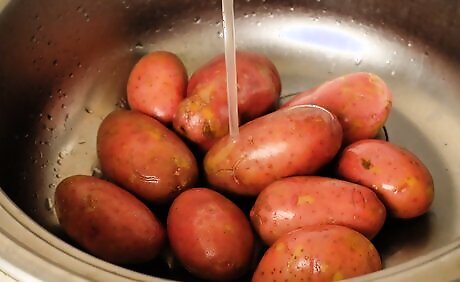
Rinse and peel 4 ⁄2 pounds (2.0 kg) of russet potatoes. For the crispiest potatoes, use russets—you'll also get potatoes that have fluffy, light centers. If you want creamier tasting potatoes that are a little less crispy, it's fine to use yukon gold potatoes instead. Rinse them under cold water and peel off the skins. Avoid using red potatoes since there's not enough starch in them to crisp up. You'll end up with dark potatoes that turn soggy really quickly.
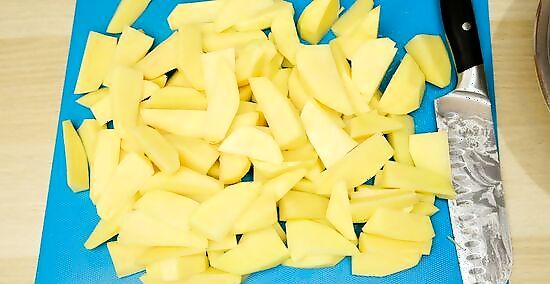
Preheat the oven to 500 °F (260 °C) and cut the potatoes into 2 in (5.1 cm) chunks. While the oven heats up, chop the potatoes into large pieces. The large surface area lets the potatoes become extra crispy. If you roast small pieces of potatoes, the centers are more likely to dry out so you're left with chewy potatoes.
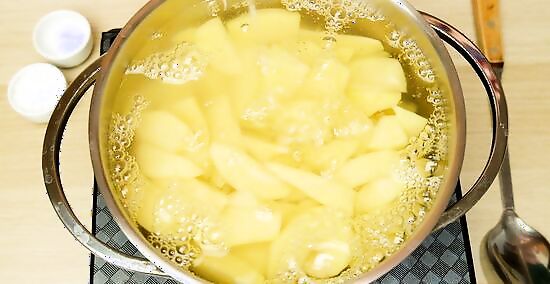
Put the potatoes into a pot with salt, baking soda, and water. Put the chopped potatoes into a big pot and pour in enough cold water to cover them by 1 inch (2.5 cm). Then, add 2 tablespoons (28g) salt and 1/2 teaspoon (2.5 g) of baking soda. The baking soda raises the pH of the water so the outside of the potatoes breaks down. This makes them softer and starchier, which helps them crisp up more in the oven.

Simmer the potatoes for 5 minutes so they soften a little. Turn the burner to high and bring the water to a boil. Then, turn the burner down to medium so the water bubbles gently. Cook the uncovered potatoes just until they start to become tender. This is called par-boiling since you're not completely cooking the potatoes. Par-boiling ensures you get roasted potatoes that are crunchy on the outside and tender on the inside. Don't boil the potatoes so they're completely soft or they'll fall apart when you get them ready to roast.
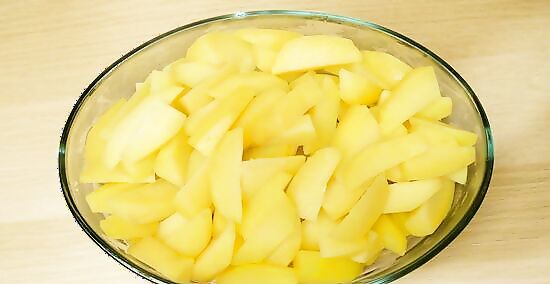
Drain the potatoes and let them air dry for 2 minutes. Set a drainer in the sink and carefully pour the potatoes into it so the water drains. Then, put the potatoes into a big bowl and let them sit for a few minutes so some of the moisture evaporates. If you don't want to dirty another dish, you could also put the potatoes back into the pot.
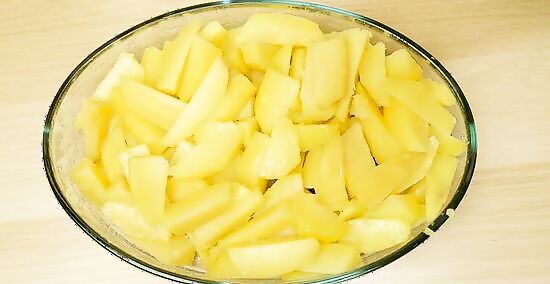
Shake the bowl to rough up the potatoes and stir in ⁄4 cup (59 ml) of fat. Grip the bowl and vigorously shake it back and forth so the potatoes knock into each other. Keep shaking until the edges are roughed up. Then, mix in ⁄4 cup (59 ml) of duck fat, chicken fat, or bacon grease. Although animal fats give you the crispiest potatoes, you can substitute olive oil in a pinch—the potatoes just might not be as crunchy.
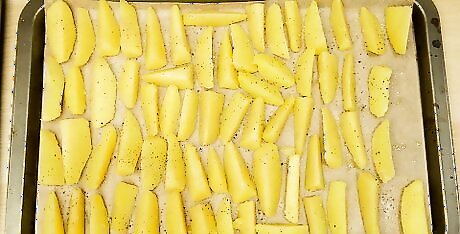
Spread the potatoes on 2 baking sheets and season them with salt and pepper. Get out 2 rimmed baking sheets and divide the potatoes between them. Then, arrange the potatoes so they're not touching and sprinkle salt and pepper over them. If the potatoes are crowded or touching, they'll steam and become soft on the outside as they roast.
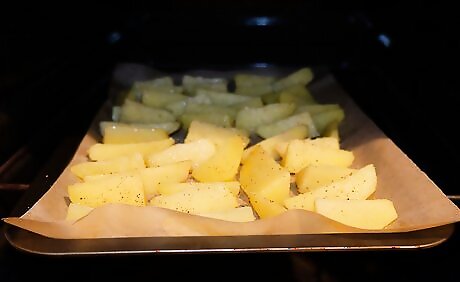
Roast the potatoes for 35 to 40 minutes, flipping them halfway through the time. You've done all the prep work so it's time to roast! Put your sheets into the preheated oven and bake the potatoes for 20 minutes. Then, flip the potatoes over and rotate the sheets. Roast them for another 15 to 20 minutes or until the potatoes are perfectly golden brown and crunchy. If your oven bakes evenly, you don't need to swap the baking sheets. You can refrigerate your leftover roasted potatoes in an airtight container for up to 5 days.











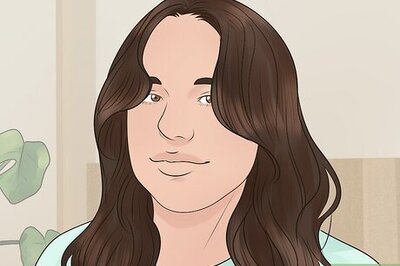



Comments
0 comment